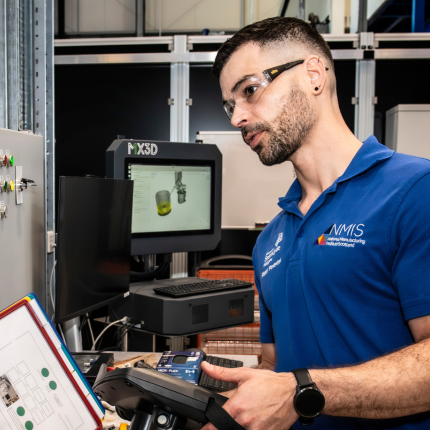MariLight 2: advancing sustainable maritime through large-scale additive manufacturing (LSAM)
Background
MariLight 2, funded by the Department for Transport’s Clean Maritime Demonstration Competition built upon MariLight 1 aiming to transform maritime manufacturing through digitally enabled, data-driven large-scale additive manufacturing (LSAM).
Led by Malin Marine Consultants (MMC), part of Malin Group, the project consortium included the National Manufacturing Institute Scotland (NMIS), Lloyd’s Register (LR), Siccar, Caley Ocean Systems, Altair, BAE Systems, and Hexagon Manufacturing Intelligence (HMI).
Challenge
Traditional maritime manufacturing presents significant sustainability, efficiency, and safety challenges, including high greenhouse gas emissions, lengthy production lead times, heavy material use, and complex supply chains. Strict industry certification requirements further hinder the adoption of new manufacturing methods.
MariLight 2 tackled these challenges by demonstrating digitally enabled LSAM combined with topology optimisation - a computational approach used in engineering to optimise material distribution within a given space, delivering structural efficiency and minimal weight. The goal was to prove this technology could meet rigorous maritime standards, with potential to significantly streamline production.
What did NMIS do?
NMIS deployed Direct Energy Deposition-Arc (DED-Arc), a welding-based additive manufacturing metal deposition technology, to manufacture the topology optimised tapping ring that was designed by Altair using their design optimisation software.This ship component was selected in discussions with industry project partners based on criteria such as critical functionality, lightweight design, and high potential for rapid industry adoption. The project specifically targeted having the maritime component operational by 2027, aligning with the CMDC4’s and wider Transport Vision 2050 objectives.
Additionally, NMIS managed the digital integration of DED-Arc cells, facilitating real-time data-driven decision-making, defect detection, and quality assurance. These efforts were enhanced by Siccar's secure data-sharing platform and HMI’s computational modelling solutions.
The tapping ring LSAM by the DED-Arc Team at NMIS was tested (hydrostatic and leak testing) at Malin’s custom fabrication facilities, all witnessed by LR, ensuring maritime rules compliance, with no leaks reported throughout the application of consistent pressure. The tapping ring successfully met the respective maritime acceptance criteria, confirming the project's alignment with stringent maritime industry standards.
MariLight 2 fostered broader sector skills and understanding of advanced manufacturing and digital integration techniques among maritime industry partners through collaboration with the NMIS Manufacturing Skills Academy.
Impact
MariLight 2 delivered substantial, measurable outcomes:
- Greenhouse gas emissions reduced by up to 10%
- Lead times reduced by up to 90%
- Vessel production time reduced by up to 20%
- Vessel weight reduced by up to 13%
- Storage and handling requirements reduced by up to 90%

Chris Dunn, Managing Director at Malin Marine Consultants said:
MariLight 2 represented a major step forward in the validation of additive manufacturing, and its potential impact on more sustainable, efficient manufacturing methods within the maritime sector. As a core member of the project consortium, NMIS played a key role in this, harnessing their technical expertise to manufacture an optimised tapping ring using DED-Arc technology.
To learn about the project in more detail and hear from the project team including, NMIS, Maline Group and Lloyds Register, watch below.
